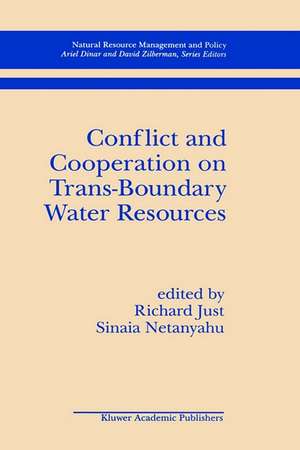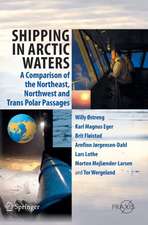Conflict and Cooperation on Trans-Boundary Water Resources: Natural Resource Management and Policy, cartea 11
Editat de Richard E. Just, Sinaia Netanyahuen Limba Engleză Hardback – 31 ian 1998
| Toate formatele și edițiile | Preț | Express |
|---|---|---|
| Paperback (1) | 952.26 lei 6-8 săpt. | |
| Springer Us – 29 oct 2012 | 952.26 lei 6-8 săpt. | |
| Hardback (1) | 958.38 lei 6-8 săpt. | |
| Springer Us – 31 ian 1998 | 958.38 lei 6-8 săpt. |
Din seria Natural Resource Management and Policy
- 18%
 Preț: 1226.24 lei
Preț: 1226.24 lei - 18%
 Preț: 958.56 lei
Preț: 958.56 lei - 18%
 Preț: 1223.74 lei
Preț: 1223.74 lei - 18%
 Preț: 948.29 lei
Preț: 948.29 lei - 15%
 Preț: 641.03 lei
Preț: 641.03 lei - 18%
 Preț: 954.93 lei
Preț: 954.93 lei - 15%
 Preț: 646.43 lei
Preț: 646.43 lei - 18%
 Preț: 955.08 lei
Preț: 955.08 lei - 18%
 Preț: 1233.37 lei
Preț: 1233.37 lei - 15%
 Preț: 651.84 lei
Preț: 651.84 lei - 18%
 Preț: 951.47 lei
Preț: 951.47 lei - 18%
 Preț: 1229.73 lei
Preț: 1229.73 lei - 18%
 Preț: 1229.28 lei
Preț: 1229.28 lei - 15%
 Preț: 643.00 lei
Preț: 643.00 lei - 18%
 Preț: 1237.14 lei
Preț: 1237.14 lei - 15%
 Preț: 645.79 lei
Preț: 645.79 lei - 15%
 Preț: 650.86 lei
Preț: 650.86 lei - 15%
 Preț: 653.14 lei
Preț: 653.14 lei - 18%
 Preț: 1233.52 lei
Preț: 1233.52 lei - 18%
 Preț: 1233.20 lei
Preț: 1233.20 lei - 18%
 Preț: 950.96 lei
Preț: 950.96 lei - 18%
 Preț: 1242.21 lei
Preț: 1242.21 lei - 18%
 Preț: 1222.01 lei
Preț: 1222.01 lei - 18%
 Preț: 951.29 lei
Preț: 951.29 lei - 18%
 Preț: 1551.11 lei
Preț: 1551.11 lei
Preț: 958.38 lei
Preț vechi: 1168.76 lei
-18% Nou
Puncte Express: 1438
Preț estimativ în valută:
183.41€ • 199.15$ • 154.06£
183.41€ • 199.15$ • 154.06£
Carte tipărită la comandă
Livrare economică 22 aprilie-06 mai
Preluare comenzi: 021 569.72.76
Specificații
ISBN-13: 9780792381068
ISBN-10: 0792381068
Pagini: 432
Ilustrații: XXV, 432 p.
Dimensiuni: 155 x 235 x 25 mm
Greutate: 0.82 kg
Ediția:1998
Editura: Springer Us
Colecția Springer
Seria Natural Resource Management and Policy
Locul publicării:New York, NY, United States
ISBN-10: 0792381068
Pagini: 432
Ilustrații: XXV, 432 p.
Dimensiuni: 155 x 235 x 25 mm
Greutate: 0.82 kg
Ediția:1998
Editura: Springer Us
Colecția Springer
Seria Natural Resource Management and Policy
Locul publicării:New York, NY, United States
Public țintă
ResearchCuprins
I International Trans-Boundary Water: Cooperation with Limited Enforcement.- International Water Resource Conflicts: Experience and Potential.- Potential for Sustainability and Self-Enforcement of Trans-Boundary Water Agreements.- Bargaining Over Shared Aquifers: The Case of Israel and the Palestinians.- Facilitating International Agreements Through an Interconnected Game Approach: The Case of River Basins.- II Domestic Trans-Boundary Water Conflict and Cooperation.- Internal Water Disputes: Causes and Solutions.- Evolving Legal and Institutional Responses to Inter-Jurisdictional Water Management Issues in the U.S..- Dealing with Interstate Water Issues: The Federal Interstate Compact Experience.- Sharing the Waters of the Murray-Darling Basin: Cooperative Federalism Under Test in Australia.- III The Expanding Scope of Trans-Boundary Water Problems.- Inter-Jurisdictional Water Quality Management: Experiences From Chesapeake Bay Nutrient Management.- Land- Use Patterns and Water Quality: The Effect of Differential Land Management Controls.- Estimating Economic and Environmental Benefits of Water Markets in a Spatially Diverse Setting.- Trans-Boundary A irshed Management as an Approach to Trans-Boundary Water Cooperation: The Case of the Chesapeake Bay.- Ecosystems and Social Conflict: Lessons from the Florida Everglades.- Privitization and Regulation of Multi-Source Water Usage.- Noncooperative and Cooperative Management of an Accumulative Water Pollutant.- Trans-Boundary Water Projects and Political Uncertainty.- IV Economic Issues in Trans-Boundary Water Allocation.- The Performance of Water Markets: Transaction Costs, Interjurisdictional Barriers and Institutional Options.- Overcoming the Introspective Legacy of Tradeable Water Entitlment Policies in South Eastern Australia.- Optimal Allocation of Ground and Surface Water in Oahu: Water Wars in Paradise.- The Efficient Sharing of an Uncertain Natural Resource: A Contract Theory Approach.- Bilateral Water Policy Coordination Under Uncertainty.- Trans-Boundary Water Allocation Between Israel and the Gaza Strip: Desalination, Recycling and Fresh Water.- V Potential Contributions of Economic Analysis to Trans-Boundary Water Cooperation.- Resolving Trans-Boundary Water Disputes: Economists’ Influence on Policy Choices in the United States.- Using Bargaining Theory and Economic Analysis as an Aid to Trans-Boundary Water Cooperation.















